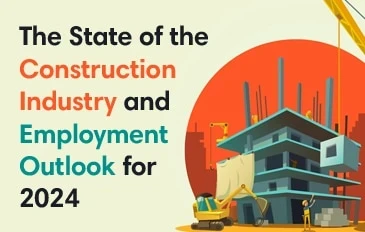The State of The Construction Industry: Employment Outlook 2024

The State of the Construction Industry and Employment Outlook for 2024
The construction industry is a vital economic sector that plays a significant role in economic growth and development. As we look ahead to 2024, it is crucial to assess the current state of the construction industry and explore the employment outlook for the coming year. This blog post will delve into the key trends, challenges, and opportunities shaping the construction industry, as well as the factors that will influence employment prospects in 2024
1. Growth and Economic Impact: The construction industry has experienced steady growth in recent years, contributing to economic prosperity and job creation. In 2024, the industry is expected to continue its upward trajectory, driven by several factors. One significant driver is increased infrastructure spending by governments worldwide to address aging infrastructure and support economic recovery post-pandemic. Additionally, population growth, urbanization, and the demand for sustainable and energy-efficient buildings will fuel construction activities.
2. Technological Advancements: The construction industry is undergoing a digital transformation, embracing advanced technologies that enhance efficiency, safety, and productivity. Building Information Modeling (BIM), robotics, drones, and augmented reality are revolutionizing construction processes, enabling faster and more accurate project delivery. The integration of Internet of Things (IoT) devices in construction sites improves data collection and analysis, enabling proactive decision-making and reducing costs. As technology continues to evolve, construction companies that adapt and leverage these advancements will have a competitive advantage in attracting skilled professionals.
3. Workforce Challenges: The construction industry faces a significant challenge related to the aging workforce. Many experienced professionals are approaching retirement age, creating a skills gap that needs to be filled by new talent. The industry must focus on attracting younger generations and promoting careers in construction through apprenticeships, vocational training programs, and educational partnerships. Moreover, diversity and inclusion efforts should be prioritized to ensure a more inclusive and representative workforce.
4. Green Construction and Sustainability: Sustainability has become a critical consideration in the construction industry. The demand for environmentally friendly and energy-efficient buildings continues to grow. With increasing emphasis on reducing carbon emissions and promoting sustainable practices, construction companies must adapt to meet these expectations. This shift towards green construction offers opportunities for skilled professionals specializing in sustainable design, renewable energy integration, and green building certifications.
5. Employment Outlook for 2024: Looking ahead to 2024, the employment outlook in the construction industry appears promising. The demand for construction workers, including architects, engineers, project managers, skilled tradespeople, and construction laborers, is expected to remain strong. The ongoing infrastructure projects, urban development initiatives, and sustainable construction practices will drive job opportunities across various sectors.
However, the availability of a skilled workforce will be a critical factor in meeting industry demands. Companies that invest in training and development programs, mentorship, and apprenticeship initiatives will have a competitive advantage in attracting and retaining top talent.
Additionally, the integration of technology will reshape job roles in the construction industry. Professionals with expertise in digital construction tools, data analysis, and automation will be in high demand. Collaborative and interdisciplinary skills, along with adaptability to technological advancements, will be essential for future construction professionals.
In conclusion, the construction industry is poised for growth and transformation in 2024. With increased infrastructure spending, technological advancements, sustainable construction practices, and a strong demand for skilled professionals, the employment outlook remains positive. However, addressing workforce challenges, promoting diversity and inclusion, and adapting to changing technologies will be crucial for construction companies to thrive in the evolving landscape. By staying abreast of industry trends and investing in talent development, the construction sector can continue to drive economic growth while providing rewarding career opportunities for professionals in the coming year.
Michael DeSafey is a leading executive recruiter for professionals in the construction, engineering, and environmental industries. He is currently the President of Webuild Staffing: www.webuildstaffing.com. To learn more about Michael, or to follow his blog, please visit www.michaeldesafey.com.
